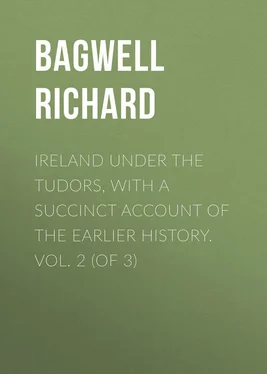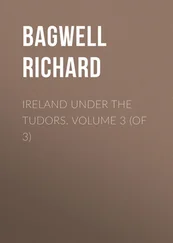Richard Bagwell - Ireland under the Tudors, with a Succinct Account of the Earlier History. Vol. 2 (of 3)
Здесь есть возможность читать онлайн «Richard Bagwell - Ireland under the Tudors, with a Succinct Account of the Earlier History. Vol. 2 (of 3)» — ознакомительный отрывок электронной книги совершенно бесплатно, а после прочтения отрывка купить полную версию. В некоторых случаях можно слушать аудио, скачать через торрент в формате fb2 и присутствует краткое содержание. Жанр: foreign_antique, foreign_prose, Историческая проза, на английском языке. Описание произведения, (предисловие) а так же отзывы посетителей доступны на портале библиотеки ЛибКат.
- Название:Ireland under the Tudors, with a Succinct Account of the Earlier History. Vol. 2 (of 3)
- Автор:
- Жанр:
- Год:неизвестен
- ISBN:нет данных
- Рейтинг книги:4 / 5. Голосов: 1
-
Избранное:Добавить в избранное
- Отзывы:
-
Ваша оценка:
- 80
- 1
- 2
- 3
- 4
- 5
Ireland under the Tudors, with a Succinct Account of the Earlier History. Vol. 2 (of 3): краткое содержание, описание и аннотация
Предлагаем к чтению аннотацию, описание, краткое содержание или предисловие (зависит от того, что написал сам автор книги «Ireland under the Tudors, with a Succinct Account of the Earlier History. Vol. 2 (of 3)»). Если вы не нашли необходимую информацию о книге — напишите в комментариях, мы постараемся отыскать её.
Ireland under the Tudors, with a Succinct Account of the Earlier History. Vol. 2 (of 3) — читать онлайн ознакомительный отрывок
Ниже представлен текст книги, разбитый по страницам. Система сохранения места последней прочитанной страницы, позволяет с удобством читать онлайн бесплатно книгу «Ireland under the Tudors, with a Succinct Account of the Earlier History. Vol. 2 (of 3)», без необходимости каждый раз заново искать на чём Вы остановились. Поставьте закладку, и сможете в любой момент перейти на страницу, на которой закончили чтение.
Интервал:
Закладка:
It was agreed that Kildare and Ormonde should meet Shane, and remain in his company till he came to the Queen’s presence. His passport to go and return safely was to be signed by the five Irish Earls, who were to undertake for the safety of his dependents in his absence. Kildare in particular undertook that the soldiers of Armagh, upon whose immediate withdrawal Shane did not insist, should do no harm until after the appointed meeting. A sum of money was to be advanced by Ormonde and Kildare, and paid through the latter. No Irishman owing Shane allegiance was to be maintained against him, and if such a person drove his cattle into the Pale it was to be restored. In return he was to go to the Queen, giving the very hostages which had been before rejected, and to forbear taking vengeance on Maguire and others. Shane refused any alteration in these terms; what he had written he had written. It was retorted that ‘seeing he would put no more in writing than was in writing already, he should look for the performance of all things written and of nothing else.’ Shane’s own terms were granted, but there was little goodwill or sincerity on either side. 36 36 Sussex to Cecil, Nov. 21.
Having practically humiliated the Lord-Lieutenant, Kildare had enough address to give the Queen the appearance of a diplomatic triumph. It had been agreed that the garrison should be withdrawn from Armagh, but the Earl persuaded Shane that by not insisting strictly on this article he would put her Majesty in good humour and make her favourable to his suits. After expressing some indignation that any attempt should be made to vary the written letter, Shane was at last graciously pleased to humour the Queen, ‘but as to th’erle of Sussex he would not molefye one yoote of his agrements; and hereupon sent his man the garison to remaynge.’ Five hundred pounds were paid over to Shane before starting, 1,000 l. awaited him at Chester, and a second 500 l. in London.
Shane came to Dublin and waited upon Sussex, who received him graciously; but this outward politeness scarcely concealed the real feelings of the two men. Shane perhaps feared that the Lord-Lieutenant, who now had him in his power, might after all send him over as a prisoner. For the same reason an encouraging letter from Mary Stuart, which only reached him in Dublin, had not the desired effect of preventing his journey. And thus, accompanied by Kildare and Ormonde, without whose escort he had positively refused to stir, and with a train suitable to his pretensions, the uncrowned monarch of Ulster took ship to visit that great princess whose authority even he was ready to acknowledge, upon the sole condition that she should never exercise it. Shane afterwards complained that he was treated as a prisoner on the journey, and that Sussex had charged the Earls on their allegiance to secure him by handcuffs. 37 37 Articles whereupon the Earl of Kildare is to be spoken with, Feb. 1, 1562 (in Cecil’s hand); Kildare to Cecil, Dec. 3, 1561; ‘Causes and matters moving Shane O’Neill’ in 1565, in Carew (No. 248). Ware says Shane sailed Dec. 3, 1561; he was at Court by Jan. 6. The terms virtually granted are in Shane’s letter to Sussex of Oct. 18, 1561. For the intention of Sussex to interpret them literally and narrowly, see his letter to Cecil, Nov. 21. For Shane’s fears, see Arnold to Cecil, Sept. 23, 1562, and Ware’s Annals .
Sussex did not conceal from the Queen his mortification at the treaty which he had been obliged to sign, at the powers given to Kildare, and at the abandonment of the campaign, from which so much had been hoped, and for which such great preparations had been made. Her Majesty’s letters had contained expressions of disgust which not only reflected on himself, but discredited the whole English interest of which he was the head, and he bitterly resented the small thanks given him for five years of arduous service. ‘Our nation in this realm,’ he said, ‘is likened to the French in Scotland. We be railed on at tables with terms not sufferable. The people be incensed to wax mad, and this is hoped to be the jubilee year.’ He complained that the Queen’s Irish policy was as useless and unprogressive as Penelope’s web, woven by one governor only to be picked to pieces by the next. It would be for the Queen’s honour either to support her representative cordially, or to recall him honourably and employ him in some other place, ‘where I can do her better service than I can now do here.’ These criticisms were well deserved. The peace with Shane was of Elizabeth’s own making, and yet, with that want of generosity which she sometimes showed, she tried to make out that its terms were not sufficiently favourable to her. Sussex showed conclusively that he had done the best thing possible under the circumstances which the Queen had thought proper to create. 38 38 Sussex to Cecil, Oct. 19 and 23, and Nov. 3; to the Queen, Oct. 23, and Nov. 21.
No sooner was Shane gone than Sussex obtained leave to follow him. The Government was left to Fitzwilliam, whose expenses were to be borne out of the pay and allowances of the absent Lord-Lieutenant, and who was directed to give all possible help to Brian O’Neill. It was perhaps thought profound policy to support the boy’s claim to the Earldom of Tyrone while the real chief of Ulster was out of the way. Sussex rightly observed that if the Queen wished to support the young Earl she could best do so by treating Shane coldly at first, and by keeping him at arm’s length till he himself arrived. This advice, which was not only sound in itself but calculated to restore the credit of Sussex in Ireland, came too late to be of much use; for Kildare had already presented Shane to the Queen. The bare rough heads of his gallowglasses, who did not lay aside their axes, their long curls, their wide-sleeved saffron shirts, their short tunics, and their shaggy cloaks of fur or frieze, which in Ireland covered a multitude of sins, made Englishmen stare; not less, says Camden, than they now stare at Chinamen or American Indians. The Ambassadors of Sweden and Savoy were present, and doubtless shared in the general astonishment created by her Majesty’s distinguished subject. Shane prostrated himself before the Queen, and then on his knees ‘confessed his rebellion with howling,’ and made his submission in Irish, which few or none could understand. The language was perhaps less humble than the posture. But Cecil was not to be put off thus; the supposed meaning of the speech was engrossed in English, and two days afterwards was signed and sealed by Shane. ‘For lack of education and civility,’ he is made to say, ‘I have offended.’ He thanked the Queen for his pardon, promised to deserve well for the future, begged her favour for the gentlemen of his company, his kinsmen and friends, and admitted in writing that he had done homage on his knees to Elizabeth as Queen of England, France, and Ireland. Shane’s pretensions were so extraordinary that the courtiers exercised their wit in inventing a style for him, and they dubbed him ‘O’Neill the great, cousin to St. Patrick, friend to the Queen of England, enemy to all the world besides.’ 39 39 For Shane’s reception at Court, see Machyn’s Diary , Jan. 4, 1561-2; his submission, with the names of those present, Jan. 6; Camden; and Campion. Spenser afterwards characterised the Irish mantle as ‘a fit house for an outlaw, a meet bed for a rebel, an apt cloak for a thief.’
Sussex received a copy of Shane’s submission at Holyhead, forwarded it to Fitzwilliam, and then went on to London; a journey which bad weather and bad roads extended to about ten days. On his arrival he had to defend himself against those who had tied his hands by the commission to Kildare, and who now blamed him for not using them more vigorously against Shane. He showed very conclusively that he had done his best under the circumstances, and threw the blame on the Irish Earl, who was entirely responsible for the terms of the treaty. Either Kildare made good his case, or it was not thought prudent to follow the matter up closely; for there seems no reason to suppose that he was censured. With the help of Sussex, Cecil immediately set himself to discover the points on which Shane differed from the Government. Written interrogatories were drawn up and answered by Shane; and then the Lord-Lieutenant replied. The nature of the controversy will be best understood from an abstract of the papers, which bring out very clearly how entirely different were the English and Irish points of view.
Читать дальшеИнтервал:
Закладка:
Похожие книги на «Ireland under the Tudors, with a Succinct Account of the Earlier History. Vol. 2 (of 3)»
Представляем Вашему вниманию похожие книги на «Ireland under the Tudors, with a Succinct Account of the Earlier History. Vol. 2 (of 3)» списком для выбора. Мы отобрали схожую по названию и смыслу литературу в надежде предоставить читателям больше вариантов отыскать новые, интересные, ещё непрочитанные произведения.
Обсуждение, отзывы о книге «Ireland under the Tudors, with a Succinct Account of the Earlier History. Vol. 2 (of 3)» и просто собственные мнения читателей. Оставьте ваши комментарии, напишите, что Вы думаете о произведении, его смысле или главных героях. Укажите что конкретно понравилось, а что нет, и почему Вы так считаете.












